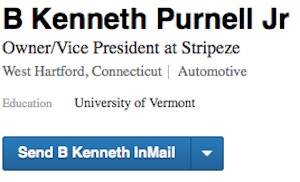Bridge inspector Barry Kenneth Purnell Jr. has not been shy about advertising his qualifications on LinkedIn, where he claims to be a licensed professional civil engineer with wide experience in project management and contract acquisition.
But failing to verify faked credentials used by Purnell proved costly for one Connecticut engineering firm.
Rocky Hill, Conn.-based Garg Consulting Services will shell out $390,000 to settle allegations by state and federal officials that it failed to properly vet the credentials of Purnell, who falsely claimed to have a bachelor’s degree in civil engineering and an Engineer-in-Training certificate from the state of Connecticut.
In reality, Purnell, 37, never graduated from college and had not even applied for the state’s Engineer-in-Training certificate, according to state and federal investigators.
At most, he had taken some continuing education courses and attended some community college, a smattering that apparently didn’t include any engineering courses, said Connecticut Assistant State’s Attorney Michael Gailor.
But that didn’t stop Purnell from forging a diploma from the University of Vermont, claiming he had a bachelor of science in civil engineering management and an EIT certificate, Gailor said. States issue EIT certificates only if an applicant has passed the “Fundamentals of Engineering” exam.
At Garg, Purnell did inspection work on one of the key railroad bridges used by Amtrak trains heading to various destinations in the Northeast Corridor, among other public infrastructure projects.
Arrested in 2014, Purnell pleaded guilty in state court in March to trying to obtain employment as a bridge inspector under false pretenses. Purnell’s attorney did not respond to a request to comment. His client is scheduled to be sentenced on Aug. 7 for larceny and faces a maximum sentence of eight years.
Garg, which performs construction management and inspection for the Connecticut Dept. of Transportation (ConnDOT), employed Purnell between 2007 and 2010. The company failed to do "appropriate employee screening" and submitted Purnell's "purported credentials" to meet requirements set forth under contracts, the U.S. Dept. of Transportation inspect general's office said in a statement. The investigation of Purnell's credentials was triggered during an internal audit, said Judd Everhart, ConnDOT spokesman.
"When we hire a contractor, we consider it the contractor’s responsibility to vet and vouch for the credentials of employees,” Everhart says. “So I’m not sure what more might have been done to prevent something like this.”
Warning Signs?
For employers, there are usually warning signs along the way, with criminal activity unlikely to happen out of the blue, said Chris Dyer, chief executive of PeopleG2, which does background checks. Review of driving, employment and court records can turn up red flags.
“It is very uncommon for somebody to all of a sudden flip a switch and start doing bad things,” Dyer said. “Usually there is a pattern there.”
Garg’s settlement ensures it will not have to face a lawsuit from the government, with the company not admitting to liability or wrongdoing.
Garg describes itself as a multi-disciplinary engineering firm with over 40 employees. It works mainly on federal and state projects in Connecticut, New York, New Jersey and Pennsylvania, said the company’s website, and is certified as a disadvantaged and minority-owned business with many agencies in the northeast U.S. The company did not return a call for comment.
Could Garg have found more clues to Purnell’s character without paying for a third party, as many companies do, to check his credentials? Perhaps. In 1995, the Hartford Courant reported that an 18-year-old named Barry K. Purnell Jr. had been charged with fifth-degree larceny but that the charge was dismissed. The story reporting the arrest and dismissal is easily found online.








